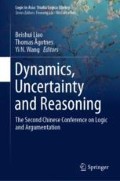Abstract
There are mainly two research directions for the dynamic of argumentation: revision and enforcement. The former studies how the semantics of an argumentation framework changes when the framework is updated, while the later studies how to enforce a given status of arguments by updating the argumentation framework. In the second direction, little attention has been paid to the problem of providing general rules for updating an argumentation framework aiming to enforce an extension of arguments. In this paper, we address this problem by a notion of characterizing the updated argumentation framework with respect to a given set of arguments.
Access this chapter
Tax calculation will be finalised at checkout
Purchases are for personal use only
Notes
- 1.
Single-assigned semantics define only one extension. The opposite is multi-assigned semantics which define more than one extension.
References
Baroni, P., Caminada, M., Giacomin, M.: An introduction to argumentation semantics. Knowl. Eng. Rev. 26(4), 365–410 (2011a)
Baroni, P., Caminada, M., Giacomin, M.: Review: an introduction to argumentation semantics. Knowl. Eng. Rev. 26(4), 365–410 (2011b)
Baumann, R.: What does it take to enforce an argument? Minimal change in abstract argumentation. In: The 20th European Conference on Artificial Intelligence (2012)
Baumann, R., Brewka, G.: Expanding argumentation frameworks: enforcing and monotonicity results. pp. 75–86. COMMA, IOS Press (2010)
Bisquert, P., Cayrol, C., de Saint-Cyr, F.D., Lagasquie-Schiex, M.C.: Characterizing change in abstract argumentation systems. In: Fermé, E., Gabbay, D., Simari, G. (eds.) Trends in Belief Revision and Argumentation Dynamics, vol. 48, pp. 75–102. College Publications (2013)
Boella, G., Kaci, S., van der Torre, L.: Dynamics in argumentation with single extensions: abstraction principles and the grounded extension. In: European Conference on Symbolic and Quantitative Approaches to Reasoning and Uncertainty, ECSQARU (LNAI 5590) (2009)
Boella, G., Kaci, S., van der Torre, L.: Dynamics in argumentation with single extensions: attack refinement and the grounded extension (extended version). In: Argumentation in Multi-Agent Systems, pp. 150–159 (2010)
Cayrol, C., de Saint-Cyr, F.D., Lagasquie-Schiex, M.C.: Change in abstract argumentation frameworks: adding an argument. J. Artif. Intell. Res. 38, 49–84 (2010)
Dung, P.M.: On the acceptability of arguments and its fundamental role in nonmonotonic reasoning, logic programming and n-person games. Artif. Intell. 77(2), 321–357 (1995)
Dunne, P.E., Bench-Capon, T.: Coherence in finite argument systems. Artif. Intell. 141, 187–203 (2002)
Liao, B., Jin, L., Koons, R.C.: Dynamics of argumentation systems: a division-based method. Artif. Intell. 175, 1790–1814 (2011)
Liao, B., Xu, K., Huang, H.: Formulating semantics of probabilistic argumentation by characterizing subgraphs: theory and empirical results. J. Log. Comput. (2017). https://doi.org/10.1093/logcom/exx035
Modgil, S., Caminada., M.: Proof theories and algorithms for abstract argumentation frameworks. In: Rahwan, I., Simari, G. (eds.) Argumentation in Artificial Intelligence, pp. 105–129. Springer, Boston (2009)
Oikarinen, E., Woltran, S.: Characterizing strong equivalence for argumentationg frameworks. Artif. Intell. 175(14–15), 1985–2009 (2011)
Acknowledgements
The authors are grateful to the anonymous reviewers for their helpful comments. The research reported in this paper was partially supported by the Fundamental Research Funds for the Central Universities of China for the project Big Data, Reasoning and Decision Making, and the National Social Science Foundation of China (No.18ZDA290, No.17ZDA026).
Author information
Authors and Affiliations
Corresponding author
Editor information
Editors and Affiliations
Rights and permissions
Copyright information
© 2019 Springer Nature Singapore Pte Ltd.
About this paper
Cite this paper
Xu, K., Liao, B., Huang, H. (2019). Updating Argumentation Frameworks for Enforcing Extensions. In: Liao, B., Ågotnes, T., Wang, Y. (eds) Dynamics, Uncertainty and Reasoning. CLAR 2018. Logic in Asia: Studia Logica Library. Springer, Singapore. https://doi.org/10.1007/978-981-13-7791-4_4
Download citation
DOI: https://doi.org/10.1007/978-981-13-7791-4_4
Published:
Publisher Name: Springer, Singapore
Print ISBN: 978-981-13-7790-7
Online ISBN: 978-981-13-7791-4
eBook Packages: Religion and PhilosophyPhilosophy and Religion (R0)

